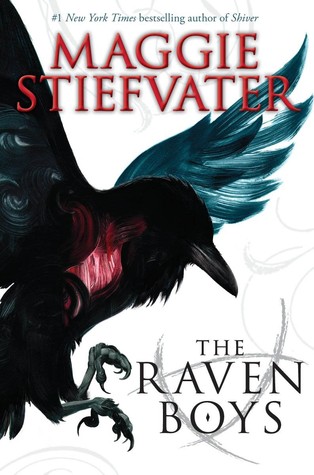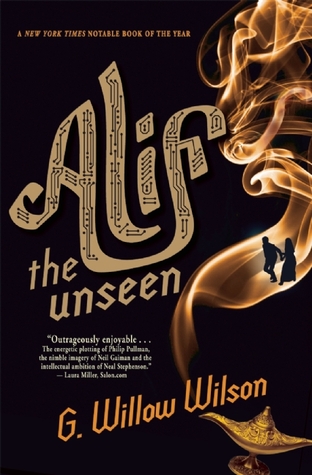We return after your abnormally scheduled hiatus! The Wednesday Scrolls roundup review will, hopefully, come next Wednesday - just in time for the July review, as well!
Anyway, onto the review.
I read
The Raven Boys a little over two years ago, not right after it had come out but not long after, either. At that time, some of my favorite 1- and 2-star reviews were of Stiefvater's
Shiver and sequels, so I wasn't happily inclined to it; still, I remember thinking that the beginning was intriguing and the writing wasn't terrible. After two hundred pages or so, though, I'd lost interest.
It took a lot less time to lose interest the second time around.
The basic premise(s) is this: Blue Sargent lives in a purely X-chromosomal household of psychics, including her mother and various aunts/friends. She has no powers herself, but everyone knows her fate: if she kisses her true love, he'll die. Meanwhile, on the opposite side of town (metaphorically speaking), obscenely wealthy 17-year-old Richard Gansey is searching for the lost Welsh king Glendower, while simultaneously holding court at obscenely wealthy Aglionby Academy boarding school. His friends -
Sharkteeth Ooh Ha Ha hot-headed Ronan Lynch, the lowborn, timid
Johnny Cade Adam Parrish, and the smudgy and otherwise un-nicknamable Noah - help him navigate both real life and the magical realm of ley lines and dreams and... um, magic stuff. Unfortunately, the two worlds are about to collide - because BLUE SEES GANSEY IN A CONTEXT WHICH MAKES IT PRETTY OBVIOUS THAT HE'LL DIE BECAUSE OF HER KISS! AND YET THEY DO NOT STAY AWAY FROM EACH OTHER AT ALL! NOT EVEN A LITTLE BIT!
I will start out with the pluses. Stiefvater has no small control of the English language, technically speaking. She commits very few, if any, rookie gaffes that should have been caught by an unbiased editor. The whole book reeks of Pine Sol for writing - it's that polished. She has a good turn at atmosphere, too, and description that only makes you think she's telling you what to imagine. It's pretty cool, I'll admit that. If you ask me what anyone in this book looks like, I'd be hard-pressed to tell you; still, my brain still knows what
it thinks they look like. Weird.
And, credit where credit's due, the whole concept is great! There are ravens and Virginia landscapes, Welsh kings and Latin trees, psychics and ghosts, and what can be technically classified as "banter." About 92% of this book's dialogue is made up of "banter." It's like a whole
Avengers: Age of Ultron battle scene, toned down to slice-of-life and stretched out over 400 pages.
The problem is that the book is exactly as tedious as that sounds.
For all the talent she has at building technically pleasant sentences, Stiefvater has no meaning of the word 'subtlety.' Even her subtlety is unsubtle. As rife with opportunity for drama as the book is,
every scene is depicted as Very Dramatic. As a result, nothing is dramatic. It's all so one-note and drenched in Gothic Undertones, the whole effect soon dries out. It becomes wearisome. When Stiefvater makes an
event out of Gansey talking about his hornet allergy, I stopped caring. The drama had no place to go because she'd already hit the drama ceiling.
As exhausting as the constant drama was, Stiefvater's floral and self-conscious style is even more draining. It's the kind of style that feels pleased with itself, and how beautifully it uses words. We all know the old adage, thrown at as as soon as we picked up a pencil: "Show, don't tell." The only thing that Stiefvater shows is that she likes to tell. A line of dialogue might come after a paragraph or two of pretentious, self-absorbed navel-gazing by any one of the novel's four POV characters.
Speaking of characters! Stiefvater loves her characters. Which is good. Always love your characters, if you're writing fiction. But along with loving one's characters, a writer has to give the reader a reason to love those characters, too. This ties in with the show-don't-tell thing, too, because Stiefvater
tells us about her children constantly. It often goes hand-in-hand with the aforementioned navel-gazing, too, which makes the telling even more grating. I don't want to know what the author is saying about this character's thoughts about themselves or about someone else! I just want to know what the character is thinking! If I had to hear one more sentence about Blue's "strangeness," when all that showed of this eccentricity was that she embroidered Goodwill boots and didn't obey her mother, I would have screamed. I did roll my eyes a lot. The relationships between Blue and the "raven boys" happened in the blank space between Chapter X and Chapter Y; Stiefvater informs the reader that Blue/Boys are friends and bypasses any pesky relationship growth that might get in the way.
The Raven Boys is increasingly popular, and I can see why. The writing style is ornate and dripping with prosody and metaphor. There are hot boys in all flavors. It appeals to the crowd that likes labeling themselves "quirky" and "old soul" while thinking about how they're not like the others in their demographic - as well as other, more sane crowds, but most noticeably that one. (Hey, I'm still a big fan of the Inheritance Saga - I can't throw too much shade at tastes.) And, like I said, the concept is so good! Not to mention that cover art. Dang. The covert art is why I initially picked it up, despite having Stiefvater's name on it.
Unfortunately,
The Raven Boys does not live up to the hype. It's a solid-enough premise that suffers from theauthorloveshearingherownwriting-itis. It's a sophomoric attempt at writing an upperclassman idea. Which is sad. Maybe after Stiefvater graduates with some sort of concentration in "finding your chill," her execution will be better.


